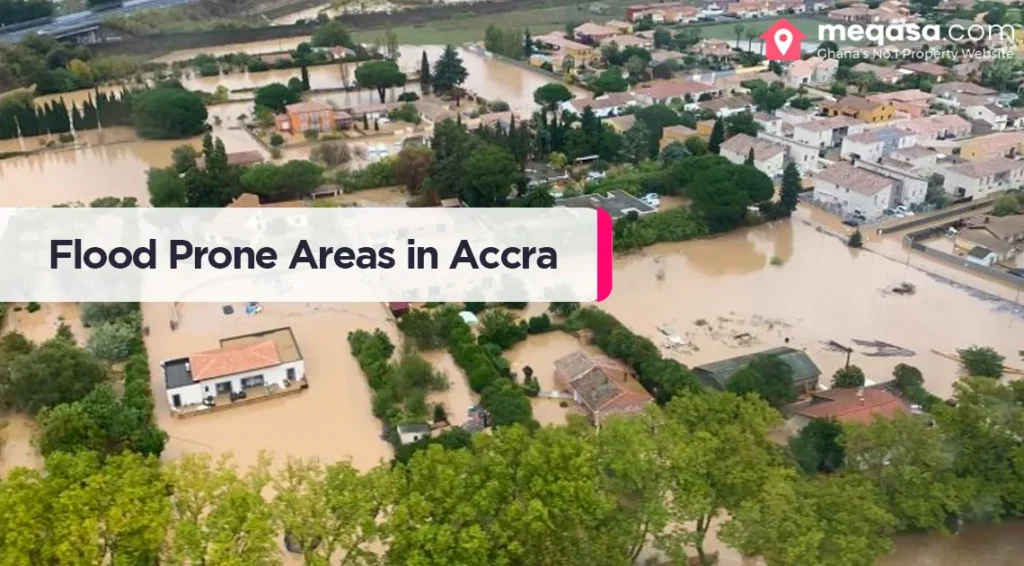The Director-General of the National Disaster Management Organization (NADMO), Major (Rtd.) Joseph Bikanyi Kuyon has issued a stern warning that structures impeding the natural flow of rivers and waterways across Ghana will be demolished without hesitation.
According to him, this decisive action is crucial to mitigating the persistent flooding challenges that threaten lives and property, particularly in urban settlements.
Speaking on the matter, Major (Rtd.) Kuyon stressed that solving Ghana’s perennial flooding problems would require bold, and at times uncomfortable, measures.
“There will be displeasure based on the actions we will take, but it is necessary to ensure that the rest of us are safe. It is obvious that some structures will have to be pulled down. It’s obvious that people who have already started filling these places will be asked to stop and redirected.”
Major(Rtd.) Joseph Bikanyi Kuyon, Director-General of the National Disaster Management Organization (NADMO)
He explained that individuals and communities that have illegally occupied waterways must be prepared for the necessary actions that would be taken to safeguard the larger public interest.

The NADMO Director-General noted that many ecosystems across the country have been disturbed due to unauthorized developments in critical water channels.
He warned that unless the natural environment is restored, the country would continue to suffer devastating consequences. “If you don’t restore it, what it means is that the people who live there—and the system itself—will suffer,” he remarked.
NADMO’s Measures
Outlining the measures NADMO intends to take, Major (Rtd.) Kuyon stated that dredging and demolitions would be intensified.
He described these steps as non-negotiable if the country is serious about effectively managing and combating the floods that loom ahead, especially with the onset of the rainy season.
“There will be dredging. There will be demolitions. We have to do it if we want to ensure that the flooding that is envisaged is effectively managed or combated. We must do what we have to do.”
Major(Rtd.) Joseph Bikanyi Kuyon, Director-General of the National Disaster Management Organization (NADMO)
Responding to questions about the scale and scope of the planned demolitions and dredging exercises, Major (Rtd.) Kuyon clarified that the initiative is not limited to the Greater Accra Region alone.

“Our focus is on all urban settlements in Ghana,” he said, stressing that although Accra appears to be the epicenter of the problem, other regional capitals and urban areas will also experience similar interventions.
He pointed out that the concentration on Accra in public discourse is due to the sheer magnitude of the challenge there.
Nonetheless, Major (Rtd.) Kuyon indicated that NADMO’s operations would cover all regions where illegal structures have obstructed the free flow of water, thereby exacerbating the risks of flooding.
On the question of the extent to which demolitions will be carried out—especially in areas where tens of houses are built on waterways—Major (Rtd.) Kuyon was unequivocal.
He emphasized that the President’s directive was clear: any structure found to be blocking water flow and contributing to potential flooding risks would be removed, regardless of the number of buildings involved.
“There is no limit to what we can destroy if the structures are creating problems. Whether it’s three, four, six, or fifty houses, if they sit on the waterways and are likely to cause flooding, they will have to go.”
Major(Rtd.) Joseph Bikanyi Kuyon, Director-General of the National Disaster Management Organization (NADMO)
According to Major (Rtd.) Kuyon, the President’s directive is to restore the waterways to their natural state, and NADMO has been given the marching orders to ensure that this is carried out meticulously and without favoritism.

He added that technical assessments would guide the demolitions to ensure that the actions taken are justifiable and in line with protecting public safety.
He further acknowledged that while the demolitions would bring about temporary hardship for affected individuals, the long-term benefits would far outweigh the immediate discomfort.
“The reality is that if we don’t act now, the flooding will continue to destroy lives and properties. We cannot allow that to happen”.
Major(Rtd.) Joseph Bikanyi Kuyon, Director-General of the National Disaster Management Organization (NADMO)
Major (Rtd.) Kuyon called for the support and understanding of the general public, emphasizing that the restoration of the waterways is in the collective interest of the nation.
He appealed to Ghanaians to cooperate with NADMO and other stakeholders involved in the operation, as the agency seeks to build resilience against the increasing threats of urban flooding.




















